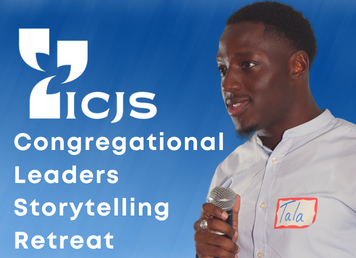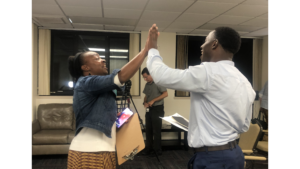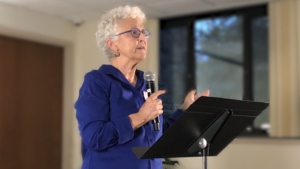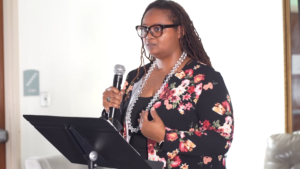
Stories have the power to create connections, build community, and catalyze change.
This insight inspired a dozen members of the ICJS Congregational Leaders Fellowship to gather at a retreat center on a recent Sunday afternoon to learn the art of storytelling, and to tell stories of their own.
“When we are willing to pull up our own stories from inside and to give of them and share, we create connection; we create change,” said workshop co-leader Hannah Hasan, who teaches the art of storytelling with her sister Shardae through their platform, Epoch Tribe. “We build bonds of understanding. We make this world a much better place.”
Storytelling lies at the heart of what happens in the ICJS Congregational Leaders Fellowship, said program director Alisha Tatem. “Stories are used to communicate our religious identities and the values espoused by each of our religions. Throughout the Fellowship, cohort members shared with one another the stories that animate their religious identities and perspectives around hospitality and how to care for our neighbors. We also used our personal stories as a group to engage difficult topics like gun violence, prayer in schools, and reproductive rights, etc.”
used to communicate our religious identities and the values espoused by each of our religions. Throughout the Fellowship, cohort members shared with one another the stories that animate their religious identities and perspectives around hospitality and how to care for our neighbors. We also used our personal stories as a group to engage difficult topics like gun violence, prayer in schools, and reproductive rights, etc.”
 As part of the workshop, Fellows shared their stories at an evening session that was broadcast over Zoom, so their congregations could watch. They chose to speak on a moment of inspiration, a time they felt helpless, or an issue where they felt called to act.
As part of the workshop, Fellows shared their stories at an evening session that was broadcast over Zoom, so their congregations could watch. They chose to speak on a moment of inspiration, a time they felt helpless, or an issue where they felt called to act.
Tala Drammeh, a member of the Muslim Community Cultural Center in Baltimore, said he was deeply inspired by a speech given by actor and director Tyler Perry who recalled helping an elderly man at a busy intersection who was asking for someone to help him cross.
“This moment reminded Perry of how he would bring his mother out of pain, into laughter, and that he would help her cross,” Drammeh said. “So now every day at 3:00 PM, I receive a reminder on my phone stating, ‘Help someone cross.’ So every day, this reminds me of my ‘why,’ which has opened many doors of my ‘what.’”
And what is his “what?”
“My ‘what’ is entering spaces with individuals from different faith, racial and ethnic backgrounds and working together to help others cross,” he said. “And as we do this, we foster communities of religious dialogue and spaces of belonging.”
Jane Ambrose, a member of St. Ignatius Catholic Community in Baltimore, spoke about her feeling of helplessness after being carjacked at gunpoint. Her car was soon recovered, but she lost something more enduring: her feeling of fearlessness that she had when she walked on the street. “Almost for two and years now, I still look over my shoulder, no matter what city or what place I am in,” she said.
She says she feels conflicted between the injustices she sees committed against people in the courts and prisons, and her own desire for justice in her case, in which a teenager received a 7- to 10-year prison sentence for the crime: “I keep thinking, what is this young man going be like when he comes back after seven-to-10 years? And at the same time, I keep wondering if there will ever come a time where I will feel safe.”
 Krista Wallace of Faith Presbyterian Church in Baltimore spoke of the pain of living in Baltimore amid the scourge of gun violence. “In the past few years, I’ve had three friends that I’ve known shot and killed, for seemingly no reason. It’s left me feeling angry. and sad, and helpless,” she said.
Krista Wallace of Faith Presbyterian Church in Baltimore spoke of the pain of living in Baltimore amid the scourge of gun violence. “In the past few years, I’ve had three friends that I’ve known shot and killed, for seemingly no reason. It’s left me feeling angry. and sad, and helpless,” she said.
But she sees reason for hope.
“In the ICJS community, it feels like there’s a candle that’s lit in that dark hallway. We’re creating a community. We’re creating that power grid to reach across,” she said. “And it’s gonna take a long time. We have a long way to go. But it does give me a little bit of hope that together we can try to make a difference.”